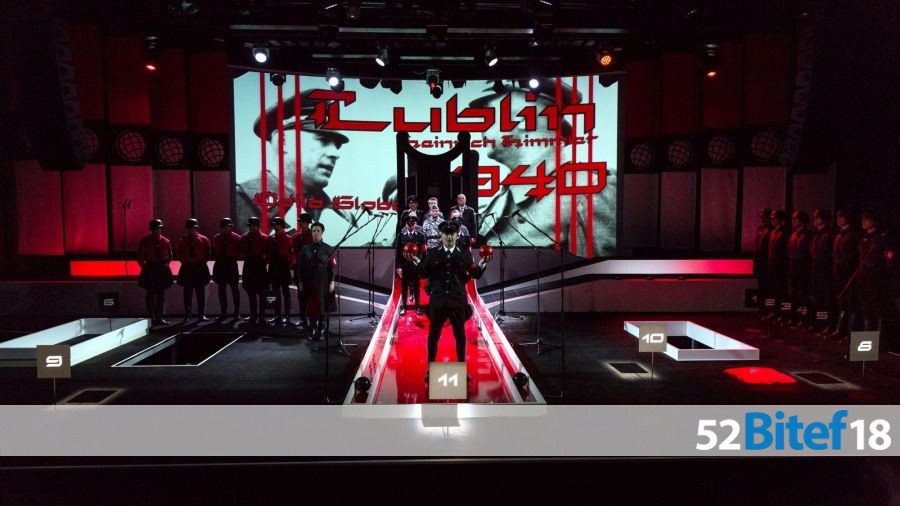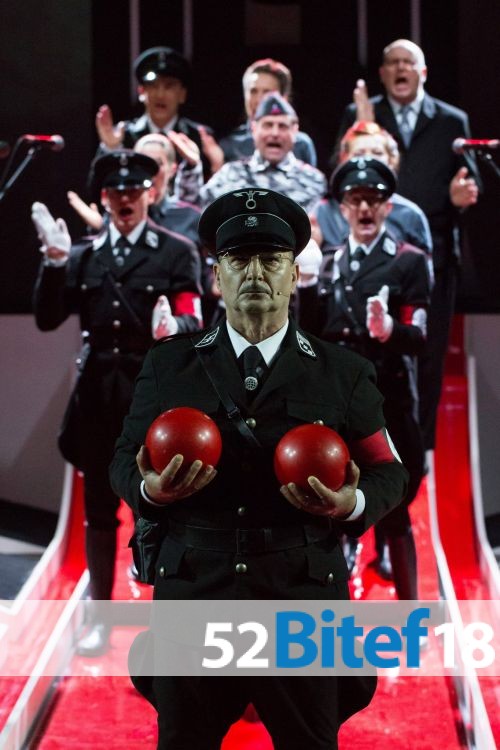Odilo. Obscuration. Oratorio. is a performance shown at this year’s Bitef out of competition, as a prologue to the festival, and deals with Nazism. Still, it does not focus that much on the problematizing of the horrible consequences which that ideology had on mankind - in this performance, that element seems to be a given - but places the emphasis on the causes of Nazism, the individuals who served as its spokespersons, and the society that agrees to put those ideas into action. Paying with the documentary biographical material of Odilo Globočnik, the director Dragan Živadinov renounces the opportunity to construct the classic drama conflict, but creates a linear narrative of the genesis of the Nazism through Globočnik and his adherents. People speak as chorus, as one voice, emphasizing the fact that they accept and reproduce “Odilo’s uniform words”. They describe the state of chaos and economic crisis most explicitly demonstrated through the absence of jobs taken by the inferior and wild “Srboslavci” (a non-existing word, a cross between the words Serbians and followers of Orthodox religion), and the lack of resources taken by the Jew, “the pioneers of materialism”. Social antagonism, class struggle, and other tensions are inherent to capitalism because modernization and industrialization mean destabilization of the existing relations, thus implying social conflicts. The problem of such instability of Odilo’s slogan is solved by the construction of ideological narrative on how the society got into crisis - not as a result of social tensions caused by capitalism, but as a consequence of the presence of a foreign factor. It is exclaimed that even one Jew is too much, which is followed by the idea that the crisis cannot be regulated by the means of passion but that things have to be organized in a thorough, systematic manner, which gives the hints of the perverted and horrible Holocaust system.
The stage design (Dunja Zupančič) represents, to some extent, one of those massive podiums which were used by the leaders of the German national-socialist party to address the masses, but with the addition of bright, garish red colour, typical of the set design at the Eurovison song competitions. Which means that what is added is one contemporary detail of pop culture which revives Nazi aesthetics with an idea to warn of the possible metamorphosis of the external characteristics of the fascist ideology and its resurrection in a more contemporary form which could deceive inattentive eye. The space arranged in such a manner is treaded by whole groups of soldiers and officers wearing Nazi uniforms, yelling Odilo’s Nazi slogans, while their movements leave an impression of a well-rehearsed and often repeated performance - the consequence of the ideological engineering they were exposed to. The authors Peter Mlakar and Dragan Živadinov question those people’s responsibility and guilt. Right from the start, the authors equal people with the Greek chorus, and give to Odilo the role of the first actor who comes forth from the chorus in order to tell what they already think, and they take him as their representative. The entre fascist doctrine is thus shown as a ritual process marked by the manic delirium of the participants, which means the lack of the rational reasoning, which gives the rest of the performance a strong tone of mindlessness.
The rest of the narrative is conducted through fragmentary structure of biographic details from Globočnik’s life. One of the most striking moments is the one in which, by playing with globes, which in this performance replace the symbol of swastika, Odilo and Hitler plan holocaust in a laid-back manner. When the chronology reaches the end of the Second World War, the entire ensemble takes off the Nazi insignia and unanimously renounces Odilo, in the same way they accepted him. The people’s statement from the beginning of the play that they accepted him as their spokesperson is now repeated in a different form. They claim now that they had accepted him only so they could tear him apart, which introduces the scene of delirious ritual mutilation of a victim, like the one unconsciously performed by Bache in Euripides’s eponymous play. It implies that the guilt and the responsibility of the people who had supported Nazism are now questionable. On the one hand, they explicitly appropriate Odilo while on the other they assign subconscious and mislead element to it. The authors, however, have no dilemma since they solve the situation by playing with the convention of the applause at the end of the performance. The big ensemble which played chorus does not come out for a curtain call because they do not deserve an applaus, since not even misconception releases them of guilt or responsibility.
Nowadays staging a performance like this one suggests the presence of a similar system of propaganda and reasoning in the rise of right-wing populism and its attitude to the new economic but also refugee crisis. The problems Europe is facing nowadays seem largely equivalent to the ones from the 30ies. What terrifies is the fact that the similarity is recognized by the rhetoric applied in an attempt to resolve tensions. The director was in no way forced to modernize the context and the time in which the plot takes place. Economic crisis, unemployment, identity crisis caused by the contact between various cultures are just some of the obvious parallels. By presenting documentary, historical material, Živadinov actually criticizes the current state in Europe and calls for caution. In the context of the festival slogan “World without Us”, that appeal for caution can be understood as a warning that, unless we confront fascism immediately, we will be able to anticipate the epilogue by the prologue.
Andrej Čanji

